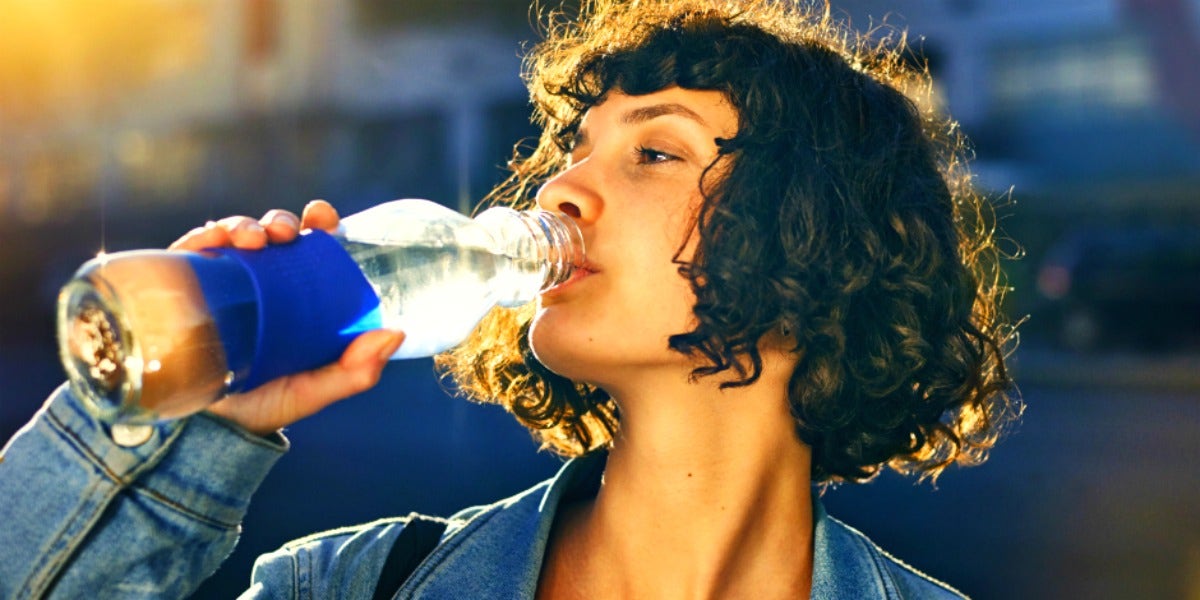How Much Water You Should Be Drinking Every Single Day
Are you drinking enough water? Or are you slacking?
 getty
getty How much water should I drink? Is it really six to eight glasses every day? Does it matter if it's hot or cold outside? What if you're being active versus sitting on your butt?
Why do we need water, anyway? Like, what's the big deal over this clear liquid stuff?
We need water for many reasons, and while some people swear it helps keep your weight down, that's not exactly accurate.
But drinking water is better than drinking soda, hence why your water habit might keep you a little trimmer. Cutting out soda means taking in fewer bad calories.
Other than our biological need for water, there are plenty of benefits to drinking it daily:
Regulates your body temperature
Helps you eliminate wastes
Lubricates your joints
Helps protect your body tissue
AdvertisementKeeps your body's organs functioning
- Helps you stay hydrated and look healthy
Dehydrated, dry skin is not a sexy look. Dehydration is not only a bad look on your skin, but it's harmful to your body. When you don't drink enough water, your body and skin dry out like a prune, and that's no Bueno. It's called dehydration.
I spent the majority of my pregnancy with my daughter dehydrated due to Hyperemesis Gravidarum, and it really hurt me physically. I had headaches and migraines. Constipation. Awful skin. It was terrible all around!
If you don't drink enough water or get water from your foods (like fruit), you can end up dehydrated and experience awful symptoms like:
- Fatigue
- Headaches
- Dry skin
- Kidney stones
- Constipation
- Confusion
On the flip side, drinking too much water can also cause problems.
When you're pounding down the water too hard, it leads to issues, the major one called Hyponatremia. Too much water dilutes the electrolytes in your blood and causes your sodium levels to decrease, leading to:
- Confusion
- Nausea and vomiting
- Seizures
- Headaches
- Coma
Sounds pretty scary, right? Well, here's the good news: it doesn't happen often. Athletes, children, and petite-framed adults are more susceptible to Hyponatremia, so if you're already worrying about this, don't.
So, enough with all this dreadful talk! How much water should you drink a day? What's the magic number?
The general rule of thumb is eight cups of water each day. However, this isn't always the case — and you will also find water in foods and other drinks, not just plain water.
Consider these factors first:
1. There is water in a lot of fruits and vegetables
By eating them, you're getting quite a bit of "hydration." Eat fruits like watermelon or berries and vegetables like cucumbers and green peppers.
2. The bigger you are, the more water you may need
A 100-pound woman versus a 200-pound man? Yeah, they won't need the same amount of water.
3. If you exercise or are active, you sweat more and lose water that way
In that case, you may need more water than the recommended amount, or you may be able to enjoy a sports drink instead.
4. Drink when you're thirsty
If you're really thirsty, drink up. If you're not, don't force it.
5. Other drinks/fluids contain water
Like sports drinks, juice, milk, tea, and broth.
All in all, while eight cups of water or 64 ounces sound perfect, you may not need that much, or you may need a little more based on your activity level.
At the end of the day, judge how you feel. You know your body better than you think you do.
Laura Lifshitz writes about divorce, relationships, women’s issues, and parenting for The New York Times, Women’s Health, Working Mother, PopSugar, and more.
